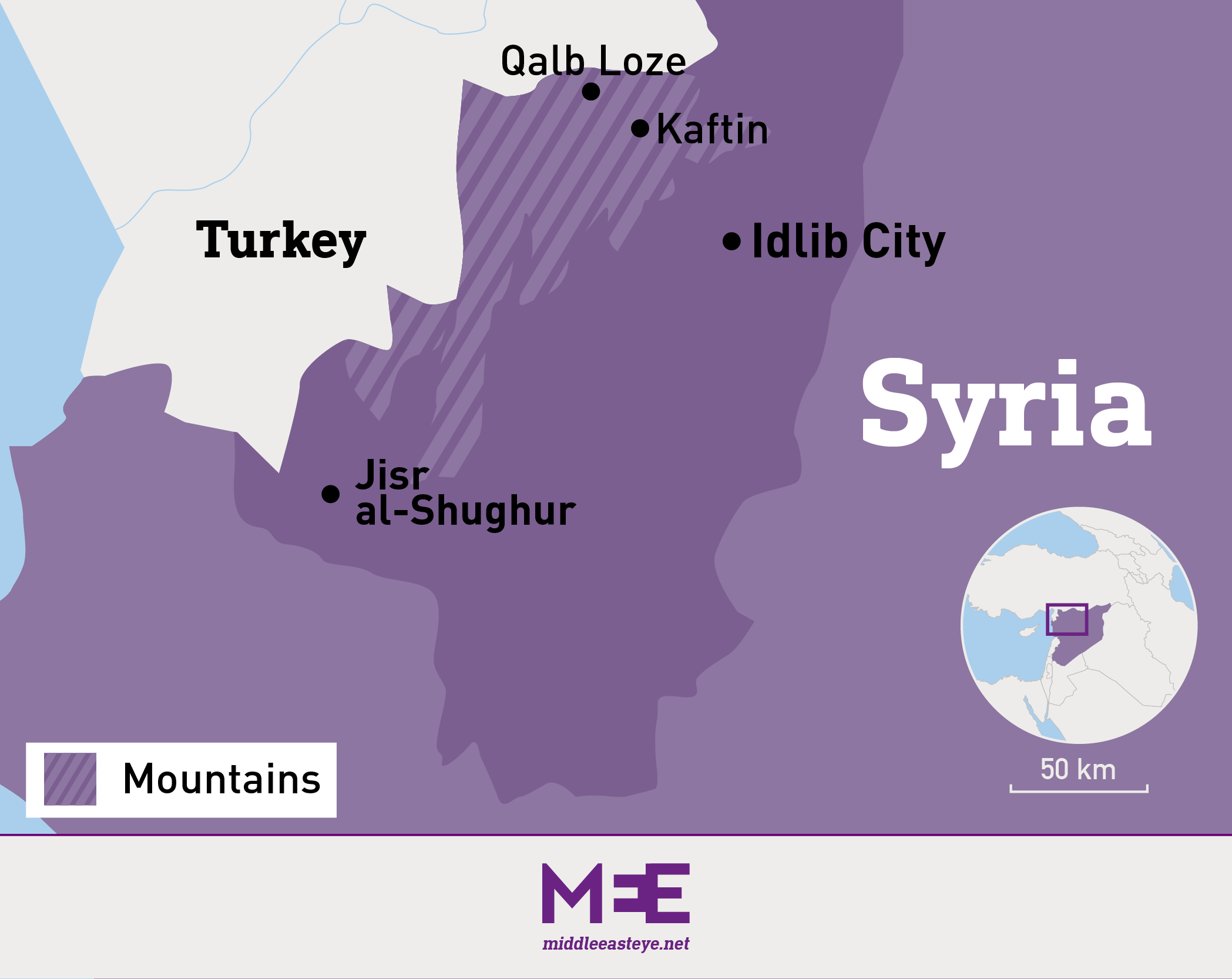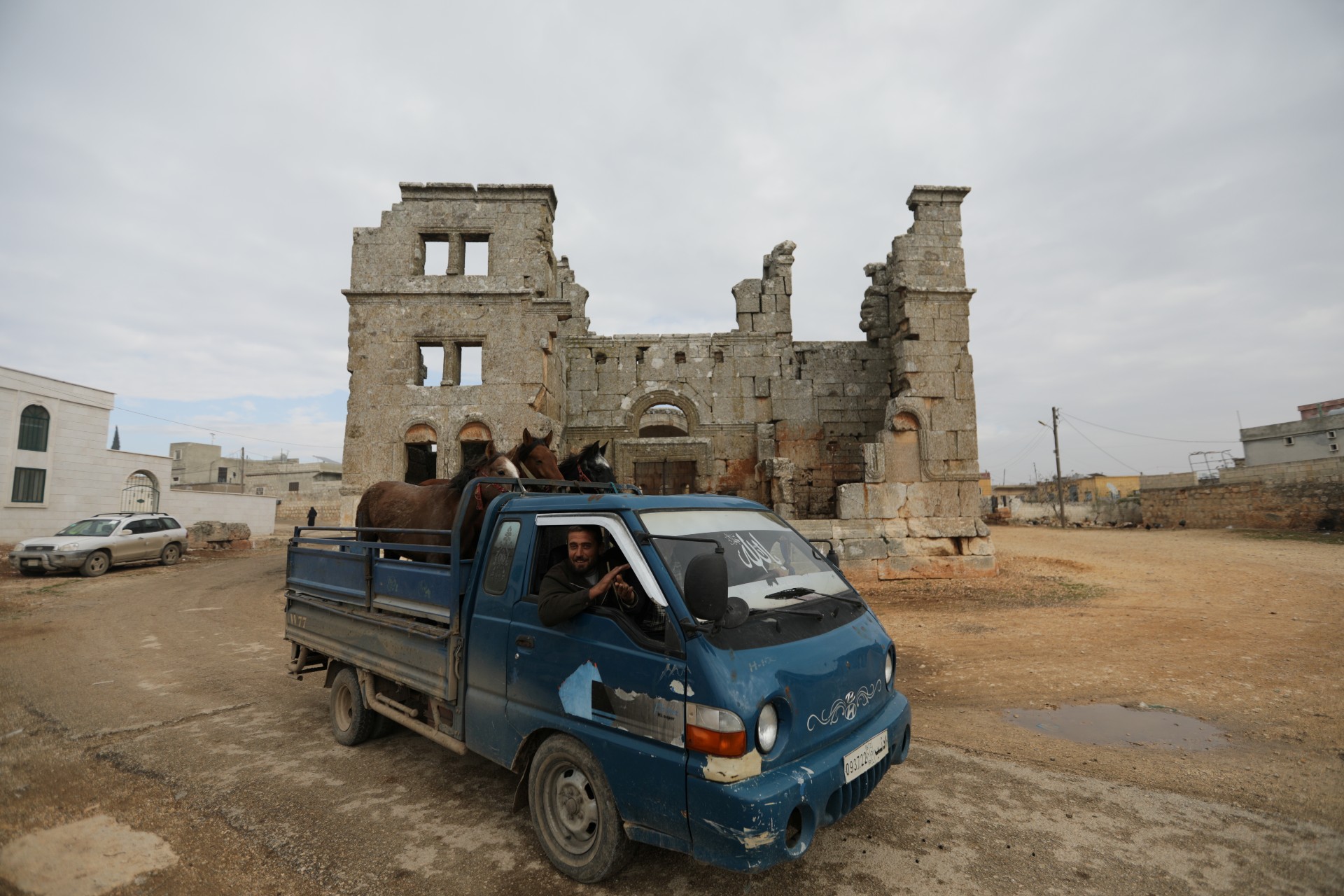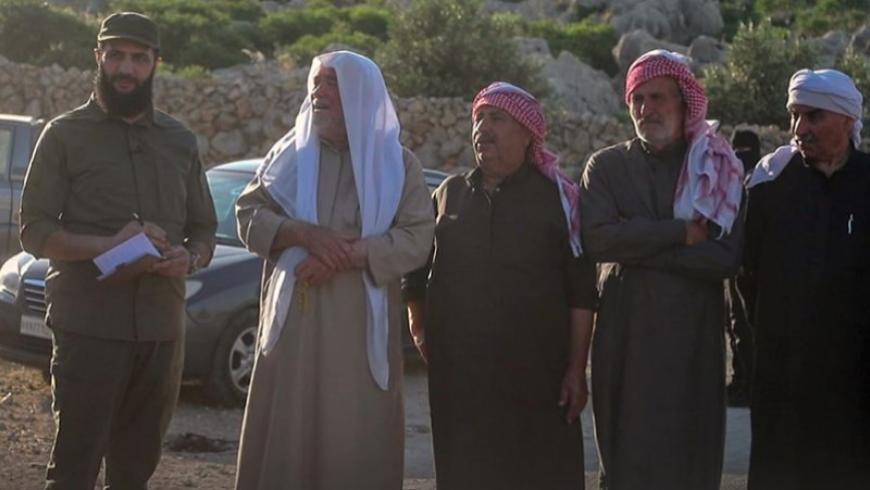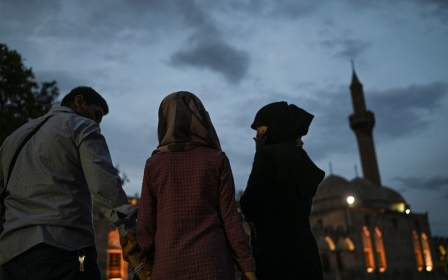Syria: Murder stalks Druze in north and suspicion falls on Uyghur militants
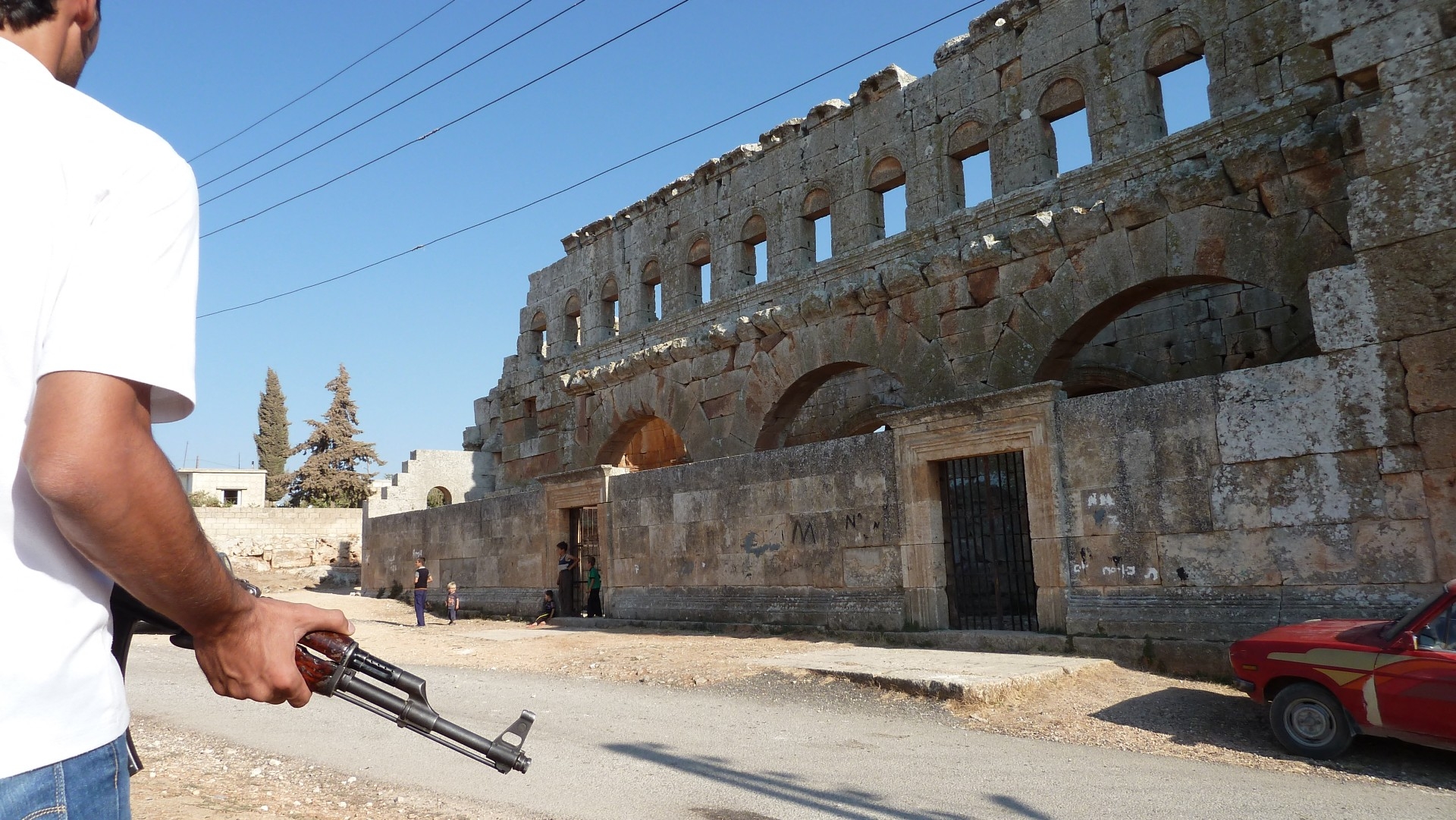
As the morning sun stretched across Jabal al-Summaq’s slopes at daybreak on Saturday, lighting up its olive trees’ thin green leaves, residents of the mountain awoke to a terrifying new crime.
An elderly Druze couple was found murdered in front of their home, shot dead in the village of Kaftin, one of 17 Druze villages in northwest Syria’s Jabal al-Summaq.
This tiny agricultural village is quiet and remote, a place with open and friendly inhabitants that can feel a world away from Syria’s decade-long war.
But residents of the area believe the murders are just the latest example of growing hostility against the Druze community, particularly among hardline foreign fighters that live in Syria’s last opposition-held enclave.
“The victims were just peaceful old people, but for the jihadists they are infidels, and killing them is an act of worship,” a Druze woman in the area told MEE. Like everyone spoken to for this report, she spoke on condition of anonymity for security reasons.
Stay informed with MEE's newsletters
Sign up to get the latest alerts, insights and analysis, starting with Turkey Unpacked
“For ten years to this day, foreign and local jihadists continue to abuse and terrorise us, to force us to leave our homes,” the woman said in a phone call, her voice trembling.
“Thousands have fled since the jihadists took control of the region in late 2012, and only those poor, vulnerable people who have nowhere to go remain. Our lives have turned into hell.”
'You are infidels'
Jabal al-Summaq, like the majority of Idlib province, is controlled by Hay’at Tahrir al-Sham (HTS), a militant group previously known as the Nusra Front that was once al-Qaeda’s Syrian affiliate.
Now the group runs its territory through a self-styled oppositional National Salvation Government, whose police forces have opened an investigation into the Kaftin murders, according to HTS-run media outlets.
Lying in the Harim range that reaches across Idlib’s northern frontier, Jabal al-Summaq is known for its strong oak trees, priceless Byzantine ruins and its Druze, a sect with pockets across Syria, Lebanon and Israel that is highly secretive about its beliefs but describes itself as a Muslim faith.
In the eyes of hardline Sunni militants, Druze are often branded as infidels, and treated as second-class citizens as a result.
It is unknown if the Kaftin murders are of a sectarian nature, as has been loudly alleged. But they come at a time when ever-present tension between Jabal al-Summaq’s Druze and the area’s other inhabitants is ratcheting up.
Earlier this month, Abdul Majeed Sharif, a former local council leader, sent out a distress call in a Facebook post, claiming Uyghur and Uzbek fighters belonging to the Turkistan Islamic Party (TIP) militant group had been increasingly harassing local Druze.
He highlighted a recent incident where foreign fighters aggressively targeted worshippers in a mosque in the village of Qalb Loze, 15km from Kaftin.
“Fighters entered a mosque before Friday prayers, one of them shouted: ‘You are Druze, you are infidels’. His comrades prevented him from loading his rifle,” Sharif wrote.
“Before that, they entered several houses and beat their owners. The residents cannot deter them, and we fear that they will commit a new massacre in the area.”
Historic crimes
Hanging over Jabal al-Summaq is the Qalb Loze massacre of 2015, when a Tunisian Nusra Front leader and his fighters gunned down at least 20 Druze residents in the village, which lies on the Turkish border.
The early years of Syria’s ongoing civil war had seen fighters and civilians displaced into the Jabal al-Summaq area, and attempts by rebels to confiscate property sparked protests, which were met with deadly force as the Nusra commander, Abu Abd al-Rahman al-Tunisi, accused demonstrators of blasphemy.
Before the massacre, Nusra forced local Druze to convert to Sunni Islam and desecrated their shrines. Many of Jabal al-Summaq’s Druze fled out of fear and in search of economic opportunities, and those who stayed practice their Druze faith behind closed doors, if at all.
Since the Qalb Loze massacre, inter-communal violence has sporadically blighted the area. Local sources say the region has witnessed around 20 attacks on the Druze community since the war began in 2011.
Awash with weapons and fighters of varying degrees of militancy, Idlib is a far from safe place to live - particularly when subjected to pro-Syrian government air strikes. Yet every time a mysterious death hits communities in Jabal al-Summaq, sectarianism is suspected to be the cause.
And bodies keep turning up. On 1 August, the corpse of a man in his 30s was found in Jabal al-Summaq's Kukku, and at the beginning of the year a man and his wife were also killed in front of their house in the same village, reportedly by a thief.
When Middle East Eye visited the region in 2018, its communities appeared particularly on edge, accusing their new neighbours of discrimination. “I swear we are Muslims, I don't know why they treat us this way,” one man said at the time, tears welling up in his eyes.
Another person recalled militants stopping him at a checkpoint, shaving off his moustache and stamping on it to insult him in front of his family. The large moustache is a Druze tradition forbidden in the hardline interpretation of Islam followed by many militant fighters.
Homes and dispalcement
Chief among those accused of being hostile to the Druze, particularly recently, are Uyghur and Uzbek fighters of the TIP. Many TIP fighters have settled in Qalb Loze and houses of Jisr al-Shughur once occupied by Alawites, the sect that President Bashar al-Assad belongs to.
Accusations of discrimination are often tied up in arguments over property, such as with the Qalb Loze massacre.
“The jihadists took over the homes of the displaced under the pretext that they were spoils, and sometimes shared the homes of the remaining residents,” a local told MEE.
Though there is reportedly an informal agreement to keep military sites out of Jabal al-Summaq, and therefore avoid air strikes, the sensitivities of the area mean media access is severely restricted. MEE was closely followed while visiting four years ago, while dozens of Uyghur fighters roamed the streets. Local sources say the situation remains the same.
On Tuesday, HTS said it had apprehended a man suspected of the Kaftin murders. Sources told MEE the arrest came after raids on communities of Uyghur fighters.
The TIP denied it was behind any of the recent abuses of Druze, including the murders on Saturday.
"All the news spread is lies. The group, since its founding, has supported the oppressed and kept away from internal problems," it said in a statement.
"Since the beginning of the Syrian jihad, the families of the Turkistan Islamic Party have not lived in Jabal al-Summaq, and there is no one from the party on the mountain."
Fraught relations
The TIP has a reputation for being one of the hardiest and most organised militant groups in northwest Syria. Its fighters began drifting to Syria in 2013 from Afghanistan, Pakistan and China, and has developed a working relationship with HTS.
Around 4,000 fighters are believed to be in its ranks.
Tensions in Jabal al-Summaq are awkward for HTS. The group has attempted to shed its al-Qaeda past and project an image of an inclusive Syrian leadership opposed to Assad’s rule in Damascus.
Yet its fighters are nonetheless the same hardline militants they have always been, and few on the ground are under any illusions that HTS is a reformed organisation.
In June, HTS leader Abu Mohammed al-Jolani, who in recent years has sought to attract Western support through moderating his language and image, met with Idlib’s Druze at the opening of a water well, promising to improve services.
Neither the Druze nor HTS's militants were pleased with the visit, however. Pro-HTS media even deleted footage of the event in an attempt to placate angry militants.
In fact, HTS’s attempts to court the community by returning properties seized by foreign fighters are believed to have sparked the latest wave of violence and harassment.
Yet Druze residents of Jabal al-Summaq told MEE they did not expect Jolani and his men to hold anyone accountable. Even Abu Abd al-Rahman al-Tunisi, the man responsible for the Qalb Loze massacre, walked free for years.
“HTS has not held accountable any jihadist involved in abuses, but it clashed with the Tunisian jihadist who committed the Qalb Loza massacre and killed him last year only when he was involved in the murder of the education minister in HTS's Salvation Government,” one resident said.
Middle East Eye delivers independent and unrivalled coverage and analysis of the Middle East, North Africa and beyond. To learn more about republishing this content and the associated fees, please fill out this form. More about MEE can be found here.


